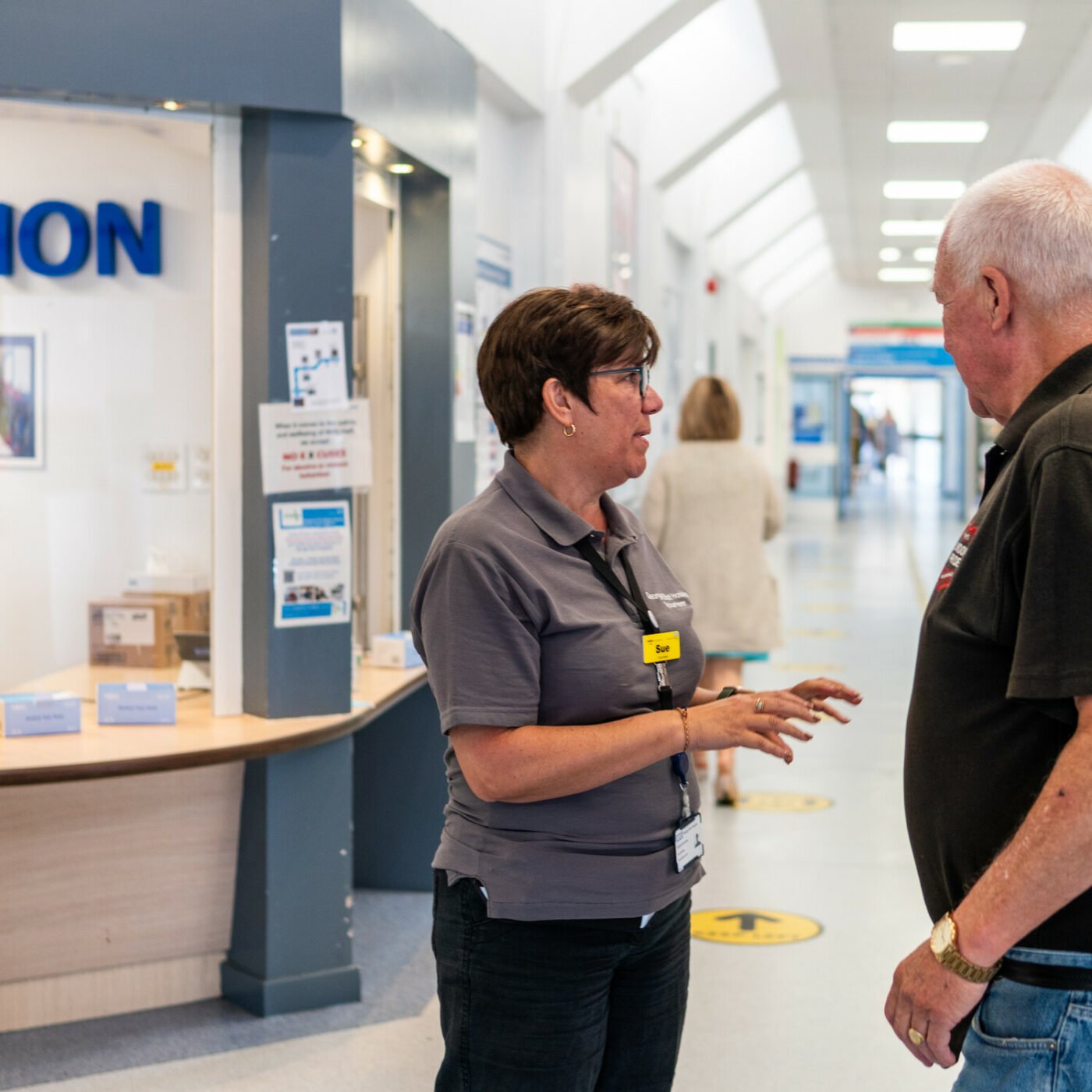4 tips for when a loved one is staying in hospital
Tags
Elderly Care
Having a loved one admitted to hospital is always a concerning time. In this article we’ve looked at advice from the NHS to help you pack and bring the right things, stay updated and feel more prepared.
Know what to pack in hospital bag
If your loved one was taken to hospital unexpectedly they may need you to bring some personal and practical items for them to use during their stay. Or, if they’re living with a medical condition that may put them at greater risk of a hospital admission, you may find it helpful to pre-prepare a hospital bag that they can take with them if an emergency happens.
The NHS and AgeUK suggests including the following basic items –
- any medicines your loved one is taking, ideally in the original boxes with the pharmacy dosage label
- a change of clothes for when they are discharged
- underwear
- pyjamas, nightwear and slippers
- an eye mask if they struggle to fall asleep when there’s lights on
- favourite toiletries such as soap, shampoo a toothbrush and a shaving kit. Baby wipes or wet wipes may also be handy
- hair ties, a soft hairband or hair clips if their hair is long and gets in the way / tangled easily
- a small amount of money for phone calls, things from the hospital shop, and for the television
- a notebook and pen to write down any questions you or your loved one would like to ask health professionals
- glasses
- hearing aid and spare batteries
- any walking aids
- things to help pass the time such as books, magazines, puzzles or something to play music on such as an ipod and headphones
- a mobile phone charger
- bendy straws, if your loved one finds drinking from a glass difficult
It’s best to avoid bringing valuables such as large amounts of money or jewellery as there isn’t always a safe place to keep them. If your loved one is admitted with these things you may wish to take them home with you when you visit.
If the admission is planned, for example for an elective procedure, you may also want to add the following hospital bag items –
- the admission letter
- the name and contact details of the doctor who referred you
Agree on how you'll stay updated while your loved one is in hospital
It can be nerve-wracking when a loved one is in hospital and you can’t be there all the time. You may wish to set up a text group on Whatsapp with your family, and agree on one person to speak to hospital staff and share updates with the group.
Some people may find it helpful to keep a diary during this time to document what the doctors are telling you and your loved one about their condition and hospital treatment.
Don't be afraid to ask questions
Hospital staff and your loved one’s medical team will want you and your loved one to feel informed and as comfortable as possible during a hospital stay. As such they’ll strive to answer your questions as best as they can, with the information they have available at that time.
Some questions you may want to ask include –
Tests
- What are the tests for?
- When will we get the results?
- Will they likely need further tests?
After being admitted
- When can we speak to the consultant?
- Will my loved one stay on this ward, or move to a different one?
- Are there set visiting hours for this ward?
- Is there a limit to how many people can visit at one time?
Treatment
- Are there any side effects or risks of their medical treatment?
- How long will they need treatment for?
- How will we know if the treatment is working?
- Are there alternative treatment options we should know about?
Leaving hospital
- What is keeping my loved one in hospital?
- What does my loved one need to do to be able to leave hospital?
- What will happen after they leave hospital?
- Do you have any written information we can take home with us?
- Where can we go for more information?
- Is there a support group or any other source of help?
Consider things back home
There are some practical things to consider outside of the hospital too, especially if your loved one is taken to hospital suddenly, or it’s unclear how long they’ll stay for.
- check your loved one’s home insurance to see what’s covered if their home is unoccupied for some time. You may need to let their insurance provider know they’re going to be in hospital for a while
- if your loved one has a good relationship with their neighbours you may want to update them on the situation so they can keep on eye on their property, water plants, and collect post.
- if your loved one has pets, arrange for someone to look after feeding, walking, and cleaning up after them. If this can’t be done by family or friends you may want to arrange for a professional pet sitter to help. Alternatively, the Cinnamon Trust is a national charity that offers fostering services while owners are in hospital.
- cancel any regular deliveries such as newspapers or milk
- If they’re receiving help at home, call and let the provider know as soon as possible. For example Elder can pause live-in care services and liaise with your carer during hospital stays
- think about the type of support your loved one might need when leaving hospital. For example you may want to set up a bed in the living room if they’re likely to struggle with stairs, or stock up the kitchen with food that’s easy to prepare, or suits their nutritional needs and tastes
- if your loved one wears dentures, you may want to mark them with their name in case they get misplaced
Sources –
https://www.covwarkpt.nhs.uk/loved-one-in-hospital/
https://www.ageuk.org.uk/globalassets/age-uk/documents/information-guides/ageukig07_your_hospital_stay_inf.pdf
https://www.nhs.uk/nhs-services/gps/what-to-ask-your-doctor/
https://www.nbt.nhs.uk/patients-carers/coming-hospital/ask-3-questions
Read more later life articles

12 summer safety tips for the elderly
It’s important for everyone to take care in hot weather – anyone can become unwell if they’re exposed to soaring temperatures. However, for older people

Live-in care vs other types of care
Live-in care vs other types of care Navigating elderly care options for a loved one is a significant decision. While care homes are a common

Defining Dignity in Later Life – Interview with Liz Lloyd
We talked to Liz Lloyd about personal and social perceptions of age, the challenges of identity, empowerment and choice.

The Challenges of Vegetarians and Vegans Living with Dementia
We talk to Amanda Woodvine about the challenges faced by older vegetarians and vegans receiving care. Read more here.

How much does live-in care cost?
How much does live-in care cost? Live-in care provides one-to-one support in the comfort of your loved one’s home, but how much does it cost?

How much does respite care cost?
Respite care offers short-term relief for primary carers, and the cost can vary widely depending on the type of care, location, and level of support